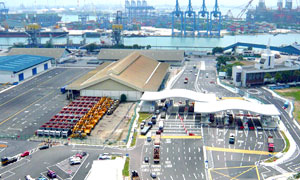India readies to launch 100 smart cities
- 7th Apr 2015
- 2926
- 0

Wikipedia, the popular online dictionary defines a smart city as, 'A city that uses digital technologies to enhance performance and wellbeing, to reduce costs and resource consumption, and to engage more effectively and actively with its citizens. Key 'smart' sectors include transport, energy, health care, water and waste. A smart city should be able to respond faster to city and global challenges than one with a simple 'transactional' relationship with its citizens'.
Closer home, the much-touted proposal of Prime Minister Narendra Modi to develop 100 such Smart cities in the country, as outlined in the budget is finally taking a step towards realization with the Union Cabinet approving the government's flagship project and the new urban renewal mission with a total outlay of about INR 1 lakh crore. As per current plans, 20 cities will be selected this year, followed by 40 each over the next two years.
Making the much-awaited announcement recently the union urban development minister Venkaiah Naidu said that a minimum investment of INR 2 lakh crore will flow in over the next five years for development of urban areas across the country, with nearly half the amount coming in from state and local bodies.
Elaborating further, Naidu said that the development of smart cities would help make urban life comfortable given the large-scale migration taking place from rural areas. He further added that urbanization was an inescapable reality which could not be reversed, but with issues like pollution, congestion and encroachment there was a strong need to rejuvenate urban areas and ensure good governance.
He also cautioned that building smart cities was a cost-intensive exercise involving huge investments and the government could not be expected to single-handedly take it forward. Therefore it was vital that urban local bodies like municipalities made concrete plans to increase their revenues, he stressed.
Selection Criteria:
Elaborating on the eligibility criteria for selecting smart cities, Naidu informed that the selection was being routed through a City Challenge scheme wherein there would be a gradation on key parameters like sanitation, drinking water supply, municipal planning, greenery, population and power supply among others.
The focus will be on creating an awareness to preserve the environment and encourage the use of eco-friendly initiatives like rainwater harvesting, water recycling and the efficient use of energy, as part of the government's ongoing endeavour to promote green buildings.
Promoting the responsible use of public transport services will also form an important component of the smart cities initiative, with the government working on solutions to reduce human interface and initiate faster clearances for such urban projects, he added.
Bids for the project:
The project will attract both technical and financial bids from interested players, with the government setting up minimum qualifying criteria, in terms of relevant experience, financial capability and access to modern technology, which will be considered before the bids are accepted.
Talking about the scope of the massive project, Naidu stated that it would be based on the public-private partnership (PPP) model with the people, while the government's role would be limited to that of a facilitator. The concerned states and urban local bodies would be the main drivers of the ambitious scheme.
Naidu further revealed that while the government welcomed private investments into this project, fourteen countries had already evinced a keen interest to partner the government in this project however no plan would be made without the people's consent and participation.
He further said that sections of the Indian industry had also shown interest take the project forward and substantial funds would be mobilized by states and local urban bodies via the PPP model to meet the costs of the project.
Ports join bandwagon: Even as the government firms ups its plans to take the smart cities project forward, Kandla and Paradip, hosts to two major port trusts have jumped into the fray, with the shipping ministry keen to develop smart cities around major ports on the basis of their massive land banks.
Even as the government firms ups its plans to take the smart cities project forward, Kandla and Paradip, hosts to two major port trusts have jumped into the fray, with the shipping ministry keen to develop smart cities around major ports on the basis of their massive land banks.
According to sources in the ministry, the government is keen to develop eco friendly industry like wind and solar parks and green townships, centered around large ports. Major Indian ports are said to own an estimated 2.65 lakh acres of land, with the Kandla Port alone accounting for about 2.2 lakh acres, while approx 1.98 lakh acres is unusable.
Early last year the government had green-lighted policy guidelines for about 265,000 acres of land owned by 12 major ports that allowed it to be used for commercial reasons. This policy was further made applicable for the entire land bank except those related to the township areas of the Kolkata, Mumbai and Kandla ports.
The decision to build smart cities around ports has the approval of the union shipping minister Nitin Gadkari, who has announced his ministry's intention to develop one smart city each across all major ports like Kandla and Paradip, under the aegis of the Sagarmala project, recently approved by the cabinet.
Further, the government plans to prepare a detailed plan for the country's coastline over the next six months, identifying potential regions to be identified as Coastal Economic Zones as part of this plan. The project will later be integrated with industrial corridors, dedicated freight corridors, the National Highway Development programme, upcoming industrial clusters and special economic zones.
In Conclusion:
PM Modi's target of developing 100 smart cities in the country as satellite towns of larger cities and by modernising existing mid-sized cities has clearly come not a moment too soon.
With the ever-increasing urban population, presently pegged at approximately 31 percent of the total population, expected to contribute nearly 75 percent to the country's GDP in the next fifteen years, there is a clear case for the planned development of smart cities in India.
However it needs to be noted here that the development has to be sustainable in terms of including economic activities that will provide long-term employment opportunities to a wide section of its residents, irrespective of their levels of education, skills or professional attributes.
Across the world, there are several such cities that have perfected this crucial balance, like Vienna, Amsterdam, Cairo, Lyon, Málaga, Malta and the Songdo International Business District near Seoul that India could do well to learn from.
Time is clearly not on our side this time, given the increasing pressures on our existing cities that are struggling to cope with the continuous influx of people putting a strain on their resources.
With an estimated 70 percent of the global population expected to migrate to cities and urban sprawls by the year 2050, India clearly needs to pull up its socks and plan for the estimated 500 cities that it will need to accommodate this huge mass of people.


Comments
Add Your Comment
Thank you, for commenting !!
Your comment is under moderation...
Keep reading other articles